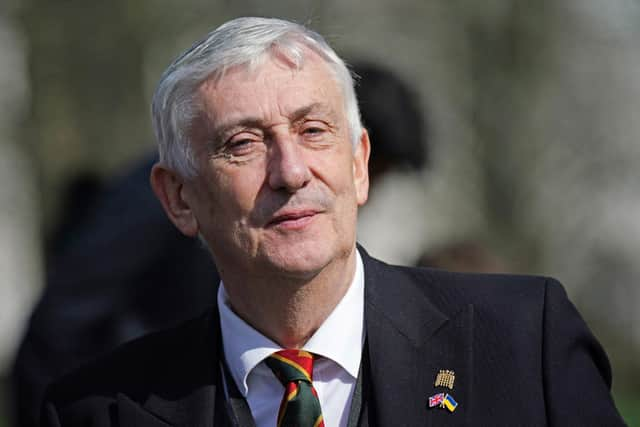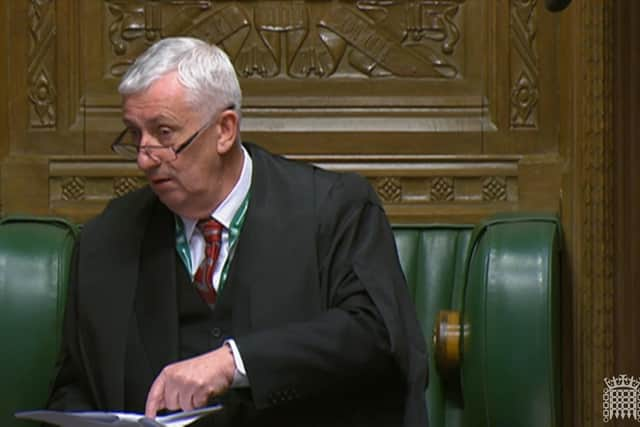Lindsay Hoyle: Who is the Speaker of the House of Commons? Does Lindsay Hoyle support Labour?
The Speaker of the House of Commons is under pressure over his handling of a debate on Gaza, which resulted in MPs passing Labour’s amendment calling for an “immediate humanitarian ceasefire” amid scenes of chaos on Wednesday night.
The motion was approved but only after Sir Lindsay Hoyle upended parliamentary convention by selecting Labour’s bid to amend an SNP motion on the Israel-Hamas war.
Advertisement
Hide AdAdvertisement
Hide AdHis decision sparked fury from the Conservative and SNP benches, who accused him of helping Sir Keir Starmer avoid another damaging revolt over the Middle East issue.


But who is Sir Lindsay Hoyle, and how did he become Speaker?
Who is Sir Lindsay Hoyle?
The son of former Labour MP Doug Hoyle, Sir Lindsay was born and raised in Adlington, Lancashire. He graduated from Lord's College in Bolton and prior to becoming an MP, he ran a textile and screen printing business.
Sir Lindsay entered politics during the 1980 local elections, when he was elected as the Labour Chorley Borough Councillor for the Adlington ward. He would go on to serve as Deputy Leader from 1994 to 1997, being re-elected on four occasions to the borough council.


Sir Lindsay was first elected as a MP in 1999, winning the constituency of Chorley as a Labour member.
As a Labour MP, Sir Lindsay served firstly as Chairman of Ways and Means and then Deputy Speaker to John Bercow from 2010 to 2019.
When did Sir Lindsay Hoyle become Speaker? What is the Speaker’s role?
Sir Lindsay was elected as Speaker on November 4, 2019 and was then unanimously re-elected as Speaker five days after the 2019 general election on December 17.
As Speaker, his role is to preside over the House of Commons’ debates, determining which members may speak and which amendments are selected for consideration.
Advertisement
Hide AdAdvertisement
Hide AdThe Speaker, who must remain politically neutral at all times, is also responsible for maintaining order during debate, and may punish members who break the rules of the House.
The role also includes representing the House on ceremonial occasional and events, acting as a spokesperson for the whole House in these instances.
The Speaker must exercise discretion on a number of matters prescribed in the standing orders of the House. Examples include decisions as to whether an application for an emergency debate is proper to be put to the House, whether to allow an urgent question, and whether a complaint of breach of privilege can legitimately be pursued in the House.
Why is Sir Lindsay Hoyle being criticised over the Gaza amendment vote?
A row erupted when Sir Lindsay decided the Commons would first vote on Labour’s amendment before moving on to further votes on the SNP’s original motion and then a Government proposal seeking an “immediate humanitarian pause”.
He disregarded warnings from the House of Commons Clerk over the unprecedented nature of the move, which provoked uproar in the chamber.
Labour’s amendment ended up passing unopposed without a formal vote after the Government pulled its participation.
It marked the first time the Commons formally backed an immediate ceasefire in Gaza, though the Government does not have to adopt the position as the vote is not binding.
The SNP were ultimately unable to vote on their proposition calling for “an immediate ceasefire”, which was meant to be the focus of their Opposition Day.
Advertisement
Hide AdAdvertisement
Hide AdSNP MPs and some Conservatives walked out of the debate in protest at the Speaker’s handling of the matter in extraordinary scenes.
Sir Lindsay said he had taken the decision to allow all sides to “express their views” and that he was “very, very concerned about the security” of MPs who have received personal threats over their stance on the Gaza conflict.
But he is facing accusations he allowed Labour to "hijack" the proceedings and was pressured into selecting the party’s amendment.
Will Sir Lindsay Hoyle have to resign from the role of Speaker?
Sir Lindsay issued an apology after a day of acrimony, but continues to face calls to resign.
More than 30 MPs have signed a parliamentary motion tabled by a Tory MP declaring no confidence in the Speaker.
Charities, including ActionAid, dealing directly with the effects of the war in Gaza have hit out at the "theatrics" in Parliament.
Comments
Want to join the conversation? Please or to comment on this article.